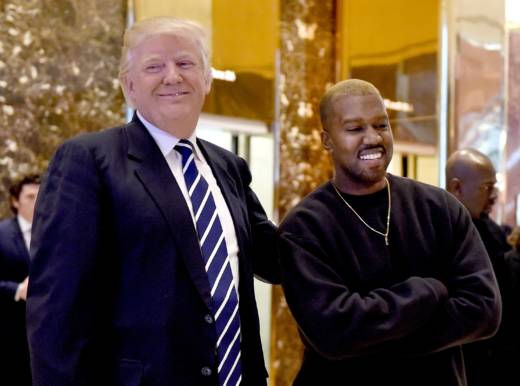When mainstream conservatives rallied around Kanye, they saw the possibility of a broader political shift: Maybe Kanye could make the GOP cool enough to upend black allegiance to the rival party. They were operating under the presumption that the arithmetic for black voting works the way it does for white voters: Conservative-leaning people vote for the GOP; liberal-leaning people vote for Democrats. Conservative publications hyped a lonely Reuters poll that showed that Trump's approval rating among black men had jumped to a slightly-less-abysmal number over the week of Kanye's MAGA-lite paroxysms. They were making a dent!
But black folks seemed to largely respond to Ye with eye rolls (or the way Van Lathan did in the TMZ video above): Is this the same dude who went off script after Hurricane Katrina to say that George W. Bush didn't care about black people? Was this some kind of elaborate troll to drum up publicity for a new album? Has Kanye lost his damn mind?
Ismail White, a political scientist at George Washington University, said that the response from black people to Kanye was to be expected: Trump remains less popular with black people than with any other racial group, and no other group leans as heavily Democratic in national elections as black folks. But there has long been debate about why those inclinations have remained so strong.
A common explanation has been the notion of "linked fate" — the belief among black folks that their individual prospects are tied to a collective well-being. But White said that belief can't really explain how the powerful norm for black people to cast votes for Democrats has maintained itself over the past 50 years; norms, after all, have to be policed.
What White and and three other researchers found in a recent study is that social pressure from other black people is how this Democratic norm gets policed. They found that the expectations around this norm were so powerful that simply having a black questioner ask a black respondent about their voting preferences made that respondent more likely to say they were voting for a Democratic candidate.
Chryl Laird, one of the study's authors, said this is how everyone votes. We like to think of our voting choices as purely rational, but we take cues from the people around us, especially when we don't know much about a candidate or an issue. Laird said social influence and pressure partly explain why most white evangelical voters in Alabama supported Senate candidate Roy Moore last fall, even after he was accused of sexual misconduct involving minors.
But she said these social effects are more intense for black people because of their history in the United States. "Even going back to slavery, during planned slave revolts, black people would find ways to socially sanction people who informed of their plans," she said. "During Reconstruction, we see instances of people who were planning to vote for the Democratic Party out of self-interest — maybe they were bribed by a white person — and those people were ostracized."
Enforcing that solidarity has historically been a matter of life or death. But entrenched segregation today keeps black people of different ideological stripes in close social and spatial proximity to one another. It's easier to enforce collective norms, to feel affirmation or sanction from black folks, when you have black neighbors, go to black schools and mosques and churches and hair salons, when you carry around around that social history and that sense of shared stakes. Black people are surrounded by black Democrats, so they vote like black Democrats.
And when they don't, they get checked. Laird pointed to an example of this from the Kanye mess: John Legend, Kanye's friend and sometimes collaborator, sent him a text message nudging him to reconsider — or just consider at all — what he was saying. (Kanye, being Kanye, posted a screenshot of that exchange to Twitter.)

9(MDAxOTAwOTE4MDEyMTkxMDAzNjczZDljZA004))

